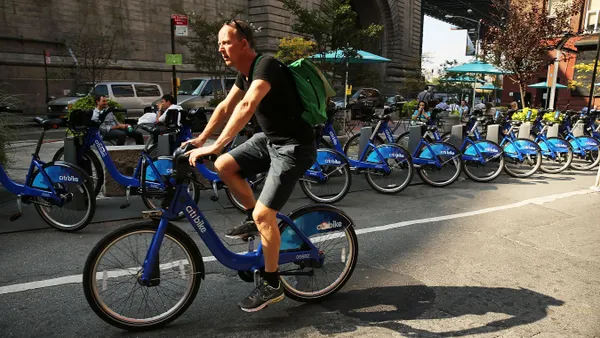Dive Brief:
- Bloomberg Philanthropies and The Aspen Institute have launched the Global Atlas of Autonomous Vehicles (AV) in Cities. It's the first global inventory of how cities are preparing for AVs.
- The effort focuses on helping cities to learn from each other, so it only shows AV pilot programs or policymaking efforts where local governments — not private developers or state/national governments — play a major part.
- The map highlights 53 cities that are currently or thinking about testing AVs, of which 35 already have AV pilot programs. The map will be updated regularly to reflect additions and advancements.
Dive Insight:
The survey began earlier this year and concluded that considering AVs in city planning is a new concept. Even the most advanced city efforts toward driverless vehicle programs are still in the early stages. A quarter of the cities surveyed had only started prioritizing the topic in the past year, and less than 10% have been working on it for more than three years. Plus, the survey showed just how few cities are even tackling the topic — only 53 so far around the world.
Cities are planning for a variety of driverless options, including taxis and freight, according to the survey. The most frequently found role for AVs is in filling "last mile" transit gaps. That includes commuting connectors and shuttles within large campuses. Although large and small cities around the world — including Austin, Detroit and Chandler, AZ in the United States and Dubai, Oslo and Singapore abroad — have pilot programs, few are testing AVs on real city streets. Most of the testing takes place in safer, more isolated areas such as technology parks, college campuses and even former Olympic sites.
Safely testing the vehicles is one of the challenges cities must address with their pilot programs. Other significant challenges that hamper progress or make it a slow process are a lack of funding, closely followed by a lack of human capacity to handle pilot projects.
The map is part of the larger Bloomberg Aspen Initiative on Cities and Autonomous Vehicles, which encourages knowledge-sharing so cities can actively contribute to the development of autonomous technologies and prepare for a driverless future. In addition to creating the map, this year the initiative brought together mayors and leaders from 10 cities around the world with industry leaders to collaborate on how AV technology can successfully exist in cities and solve challenges. More gatherings and discussions are planned to further advance cities' AV preparations.










